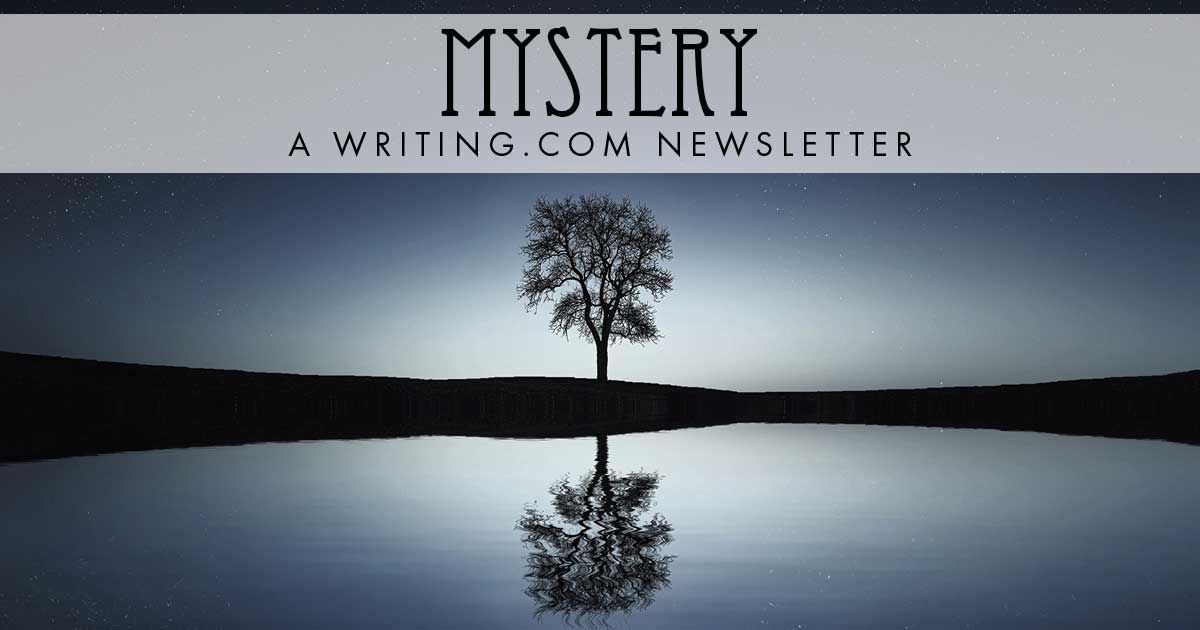This week: Getting our stories straight Edited by: Arakun the Twisted Raccoon  
More Newsletters By This Editor 
![Table of Contents [#401437]
Table of Contents](https://shop.Writing.Com/main/trans.gif) ![Table of Contents [#401437]
Table of Contents Table of Contents](/main/images/action/display/ver/1709303267/item_id/401437.png)
1. About this Newsletter
2. A Word from our Sponsor
3. Letter from the Editor
4. Editor's Picks
5. A Word from Writing.Com
6. Ask & Answer
7. Removal instructions
![About This Newsletter [#401439]
About This Newsletter](https://shop.Writing.Com/main/trans.gif) ![About This Newsletter [#401439]
About This Newsletter About This Newsletter](https://www.writing.com/main/images/action/display/ver/1709303676/item_id/401439.png)
Quote for the week:
"Mystery spread its cloak across the sky.
We lost our way.
Shadows fell from trees.
They knew why."
~From "House of Four Doors" by the Moody Blues |
![Letter from the editor [#401442]
Letter from the editor](https://shop.Writing.Com/main/trans.gif) ![Letter from the editor [#401442]
Letter from the editor Letter from the editor](https://www.writing.com/main/images/action/display/ver/1709303784/item_id/401442.png)
Some people are better at lying than others. Sometimes, you have to know a person really well to determine if they are lying, but even then, it isn't always easy. When my children were little, it was always easy to tell if my daughter was lying, but quite difficult with my son.
When police question suspects and witnesses, they have a difficult job sorting out truth from lies. The hardest part might be overcoming their own biases. For example, an interviewer might be more likely to believe a story told by a Sunday school teacher than one told by a career criminal. However, unfortunately, nobody can really be trusted to tell the truth 100% of the time. A normally honest person might lie for many reasons. They might be trying to protect someone they love or have been threatened by the true guilty party. In some cases, a person might give false information if they believe it is the truth.
Experienced poker player learn to recognize "tells" or things other players do subconsciously if they have a good or bad hand. For example, a player might lick his lips when he has a good hand and bite his lip when he has a bad hand. The tells will be different for everyone, and the experienced player may need to play several games with an opponent before they recognize them. This is the origin of the term "poker face," because some players have learned to show no emotion no matter what cards are dealt to them.
Interviewers can sometimes recognize similar tells when they interrogate witnesses. Some people might get visibly nervous when lying which can be shown by excessive sweating, fidgeting, or change of posture. It is important to remember that some truthful people might be quite nervous just because they are being questioned by police.
For some people, lack of eye contact is a sign they are lying, but this is a clue that is often misunderstood. In some cultures, lack of eye contact when speaking to an authority figure is a sign of respect. Neurodivergent people often have difficulty making eye contact in all situations. Knowledge of the subject is necessary in order to use eye contact as a clue.
When telling complicated lies, a suspect might give inconsistent answers, forgetting what exactly what they said previously. Interviewers might ask the same questions more than once in order to pick up on inconsistencies.
If a witness gives a different account than other witnesses, it might be a sign that they are lying (or that everyone else is.) However, if several witnesses give identical accounts that seem rehearsed, it might also mean that they have gotten together to get their stories straight. Police usually interview witnesses separately to compare their accounts and make sure they don't just repeat what another witness has said.
When some people are faced with a question they do not want to answer, they might become belligerent or try to deflect the question or change the subject. For varying reasons, an attorney might advise clients not to answer any questions, but this does not mean the person is guilty or can't be trusted.
Remember that no tells are universal. An action that might indicate one person is lying might be a simple habit for another person.
Something to try: Write a mystery story where a witness is lying.
|
![Editor's Picks [#401445]
Editor's Picks](https://shop.Writing.Com/main/trans.gif) ![Editor's Picks [#401445]
Editor's Picks Editor's Picks](https://www.writing.com/main/images/action/display/ver/1709303830/item_id/401445.png)
| | Halo Effect  (13+) (13+)
Reviews welcomed. Darkness descends, but light prevails in a peculiar way. Nominee
#1950165 by Nixie   |
|
![Word From Writing.Com [#401447]
Word from Writing.Com](https://shop.Writing.Com/main/trans.gif) ![Word From Writing.Com [#401447]
Word from Writing.Com Word from Writing.Com](https://www.writing.com/main/images/action/display/ver/1709303874/item_id/401447.png)
Have an opinion on what you've read here today? Then send the Editor feedback! Find an item that you think would be perfect for showcasing here? Submit it for consideration in the newsletter!
https://www.Writing.Com/go/nl_form
![Ask & Answer [#401448]
Ask & Answer](https://shop.Writing.Com/main/trans.gif) ![Ask & Answer [#401448]
Ask & Answer Ask & Answer](https://www.writing.com/main/images/action/display/ver/1709303902/item_id/401448.png)
| Question for next time: What subjects would you like to see discussed in future mystery newsletters? |
![Unsubscribe [#401452]
Removal Instructions](https://shop.Writing.Com/main/trans.gif) ![Unsubscribe [#401452]
Removal Instructions Removal Instructions](https://www.writing.com/main/images/action/display/ver/1709303960/item_id/401452.png)
To stop receiving this newsletter, click here for your newsletter subscription list. Simply uncheck the box next to any newsletter(s) you wish to cancel and then click to "Submit Changes". You can edit your subscriptions at any time.
|
